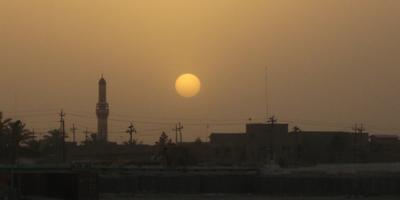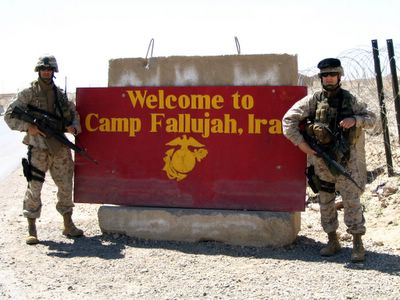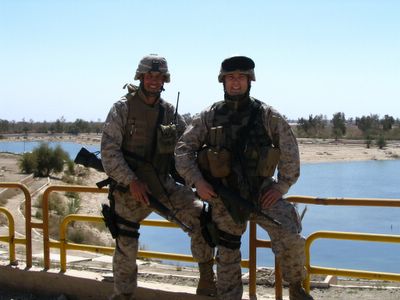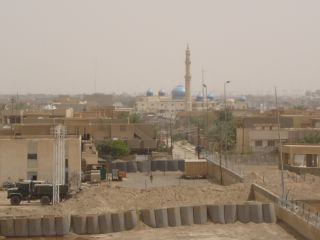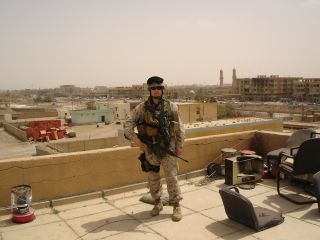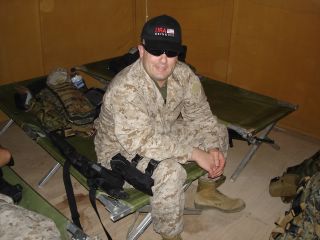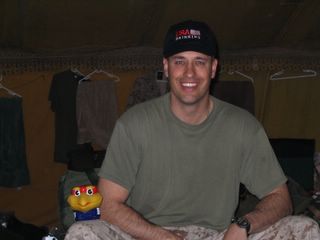Media and Iraq in general and Fallujah, specifically
Now, my (very few) regular readers know that I don't like to preach much. I know this blog is being read by you-know-who, but that's only part of the reason. The real reason is that I'd prefer to show you pictures of every day life in Iraq rather than give you my views on events that are beyond my control and out of my lane. However, in reading the below piece from Jack Kelly, it struck me that I haven't shared with you my own little first-hand brush with media bias. So here goes:
We've hosted several media correspondents (print and TV) out here at the CMOC ... LA Times, NY Times, Fox News, CNN, Knight-Ridder, AP, UPI, even GRD (German) TV. I have, to a man/woman, gotten along well on a personal level with every single correspondent that's come through here.
However, almost invariably, the "good parts" of the story get covered up and obscured by the bad news, or the "facts" are reported in a manner which makes things appear to be worse than they actually are. For example, one recent visiting correspondent (I'm not going to name names here, you can google it just as easliy as I can), in reporting on reconstruction progress in Fallujah, wrote words to the effect that "only 60% of the homes in the southern part of Fallujah have power or water."
Now, reading that, you'd think that we just plumb were not doing our jobs here, wouldn't ya? Well, the reporter was technically correct. We do still have some work to do in the southern part of the city. However, the real story is that, prior to our arrival, ZERO PERCENT of homes in the southern part of Fallujah had power or water. Yes, on our watch, contractors solicited by us and paid for by us have gone in and put power to poles and water to pipes where previously there was none! Your intrepid correspondent chose to report it this way, despite the fact that he had been shown a brief which graphically displayed before-and-after status, and he had been told what I just wrote here. I reckon it just "reads better" that 40% of Fallujans in the south don't have power or water, despite our efforts and ongoing plan to get it there, hm?
I'm not trying to imply that all media are bad or purposely mis-represent the facts, but just remember to keep an open mind when you're reading anything: this blog, mainstream media, DoD press releases. People are naturally biased one way or the other, and it follows that our passion about issues seeps into whatever we write or produce, even though we may try to keep it "fair and balanced" -- to borrow a phrase.
Anyway, for the real scoop, check out folks like Michael Yon, Michael Fumento, Ollie North, and yes, even "MSM" CNN correspondent Jane Arraf, to name but a few.
Washington Times
August 21, 2005
Familiar Patterns
By Jack Kelly
Near the end of his touching account of the funeral of Lance Cpl. Brian Montgomery, one of six Ohio Marine reservists killed in an ambush Aug. 1, the Los Angeles Times' David Zucchino reported a fact I have seen nowhere else:
"Before leaving Iraq, Eric made his buddies promise they would track and kill the insurgents who took his brother from him. Last week, he said, a squad member's mother called to relay a message from Iraq: 'We got the [expletive].' "
News reports from Iraq typically lead with U.S. casualties, usually without putting them in context or reporting what happened to the enemy. Two days after Brian Montgomery's death, 14 Marines from the same battalion were killed when a roadside bomb destroyed the amtrac in which they were riding. It was Page One news all over the country. But there was little on Operation Quick Strike, in which they were taking part.
Imagine if correspondents covering the Normandy invasion had emphasized American casualties, while downplaying the strategic significance of the battle, the greater losses of our enemies and the valor of our fighting men. Would people on the home front have become discouraged?
Suspicions Iraq war coverage is intended to discourage the home front have deepened because of the massive coverage accorded Cindy Sheehan, recently camped out on the doorstep of President Bush's ranch in Crawford.
Cindy's son, Casey, was killed in Iraq last year. She suffered a terrible loss, but no different than that of more than 1,800 other mothers. Why have the media given Mrs. Sheehan so much attention and so little to the others? Could it be because Mrs. Sheehan opposes the war, and most of the others do not?
This is a familiar pattern for journalists. Thousands of Americans lost husbands, wives, fathers, mothers, brothers and sisters in the terrorist attacks of September 11, 2001. But media attention was lavished on a handful -- the so-called Jersey Girls -- stridently critical of President Bush.
Soldiers and Marines in Iraq have complained bitterly that journalists exaggerate their difficulties and give short shrift to their accomplishments. "I know the reporting's bad because I know people in Iraq," Mark Yost, associate editorial page editor of the St. Paul Pioneer Press, said in a July 12 column.
"I get unfiltered news from Iraq through an e-mail network of military friends who aren't so blinded by their own politics that they can't see the real good that we're doing there," Mr. Yost said. "The fact that makes this all the more ironic is that the people who are fighting and dying want to stay and the people who are merely observers want to cut and run." Mr. Yost was subjected to a torrent of criticism from thin-skinned colleagues.
"I'm embarrassed to have you as a colleague," wrote Pioneer Press reporter Charles Laszewski. Knight-Ridder Baghdad bureau chief Hannah Allam (Knight Ridder owns the Pioneer Press) said only the press knows the real story.
Steve Lovelady, editor of the Columbia Journalism Review, in an e-mail exchange with Web logger Jeff Jarvis implied Mr. Yost should be fired because "he's a right-wing shill who belittled and betrayed hundreds of reporters who go into harm's way every day to tell us what the hell is really going on."
But most journalists rarely leave the fortified green zone. "It's very confining for our staff to go into Baghdad and have to spend most of their time on the fifth floor of the Palestine Hotel," said Mike Silverman, Associated Press managing editor.
Kathleen Carroll, AP executive editor, said it was much easier to add up the number of dead than to determine how many hospitals got electricity on a particular day or how many schools were built.
Mr. Silverman and Miss Carroll were recounting to the New York Times' Katherine Seelye a July AP editors' discussion of reader complaints that only one side of the Iraq story was being told.
The AP could, of course, embed more of its reporters with U.S. troops. But then they would be in greater danger than at the Palestine Hotel, and would be deprived of its comforts.
Jack Kelly, a syndicated columnist, is a former Marine and Green Beret and a former deputy assistant secretary of the Air Force in the Reagan administration. He is national security writer for the Pittsburgh (Pa.) Post-Gazette.


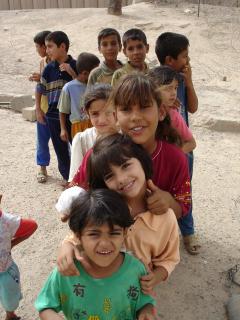
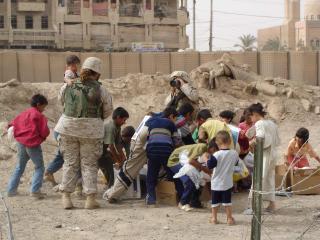
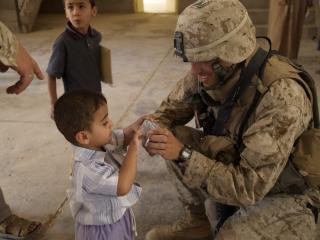
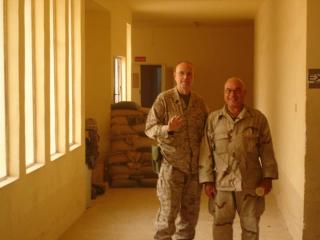

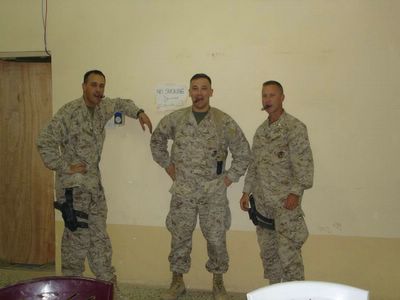

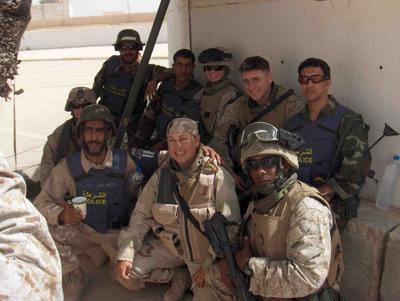


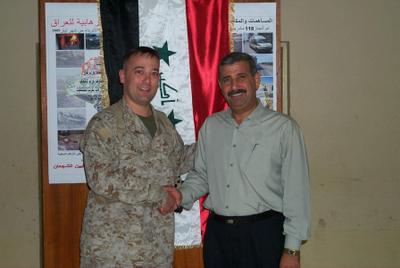 The newly-elected mayor of Fallujah takes time to pose with lil' ol' me.
The newly-elected mayor of Fallujah takes time to pose with lil' ol' me.